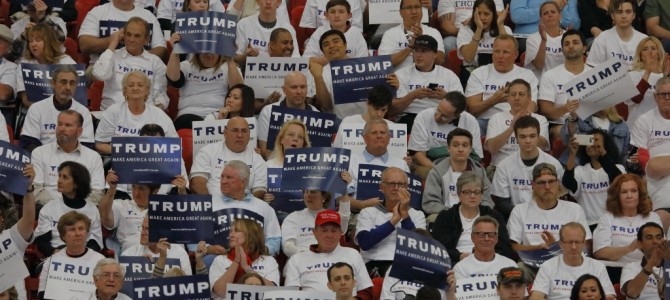Last night, Donald Trump booster and radio talk show host Laura Ingraham urged the GOP’s remaining candidates to avoid a “bloodbath” at the convention. “I don’t see what the point of all this is,” she explained.
Well, there is a great point, actually: taking the nomination away from Trump.
Ted Cruz could still conceivably win. But there’s no soft landing in this scenario. No rapprochement. No team building exercise is going to fix the 2016 iteration of the Republican Party. There is only going to be a crack-up, no matter who captures the nomination. If that’s true, and if it means one side has to prevail, why not save your party from a hostile takeover that could potentially cost a party both the Senate and the House?
The key would be denying Trump the 1,237 delegates necessary to secure the nomination. Cruz (maybe with John Kasich) could still pull together the requisite number of delegates to block Trump from winning before the convention.
Voters don’t decide the nominations; delegates do and preferably in smoke-filled rooms where rational decisions about the future of a party can be hashed out. The Republican Party is not a direct democracy. It crafts its own rules, and it can change them. And Republicans would have to ask themselves: “Is it worth upsetting a bunch of angry, marginally conservative voters who often have a minor fidelity to the doctrines of your party, or are you prepared to put your political infrastructure and full weight behind a cartoonish, George Wallace-like character who’ll probably inflict more damage than you could ever hope to repair?”
RNC Chairman Reince Priebus says that he expects every GOP presidential candidate to maintain his pledge to support the eventual nominee. Considering what we heard in Marco Rubio’s concession speech, I find this difficult to believe. At best, Priebus is going to have a bunch politicians tiptoeing around Trump in tacit non-support. And if enough big-name Republicans end up supporting Trump, it only accentuates the need for a new party.
An ABC exit poll — with all the usual caveats about the unreliability of exit polls — said that six in 10 non-Trump supporters say they would “seriously consider a third party if he became the GOP’s nominee.” The more disgust about his big government positioning and ugly rhetoric generate, the higher that number rises. And there is a number of rational reasons to support such a run.
For starters, Trump supporters are already super angry about everything. It’s not like they could be any angrier with the establishment. Once Trump is gone, and he’ll leave behind no coherent movement, these voters will have to come back and look for alternate candidates with compelling messages or leave the party altogether.
In the short run, a third-party candidate may insulate down-ballot candidates from Trumpism. You do remember Todd Akin, I’m sure? Imagine a candidate being ceaselessly asked to comment on the various impulsive and unsavory positions the presidential nominee has taken. Do you agree with the GOP nominee that children of terrorists should be executed? Offering a conservative alternative — whether it be Cruz, Rubio, Republican Sen. Ben Sasse of Nebraska, or whoever — would allow candidates to endorse an alternative that jibed more faithfully with their beliefs. This could shield them somewhat from this dynamic.
A third party would also help sink Trump and elect Hillary Clinton. A weakened and corrupt Democrat that Republicans would unite against in Congress is a far better reality than allowing a charlatan to hollow out a party from within.
It is an utter disaster, not only for Republicans but the nation, to have one functioning political party. Despite some wishful thinking on the Left, conservatives have often held their own in Congress these past eight years. Supporting gridlock is a conservative position, even if it’s not ideal. In fact, GOP voters would be better off thinking about Washington as a collection of institutions, with the legislative branch being the more realistic center of conservative power.
Earlier this week, Rubio (the most hated man from the establishment since Jeb Bush helmed the ship) argued that conservatives who back Trump will one day ask themselves: “My God, what have we done?” This gives politicians like Chris Christie far too much credit for introspection. But for those who still care about the underlying principles of their party, it probably still matters. And it’s important to remember that the primary process rules are neither chiseled into stone on Mount Sinai nor part of the Constitution.









